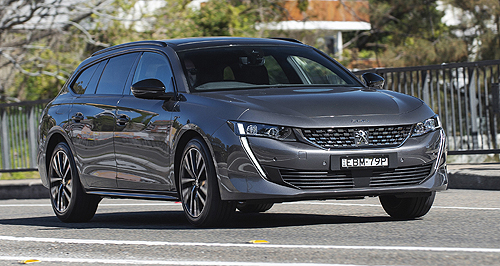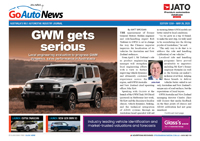New models - Peugeot - 508Driven: Peugeot 508 liftback and wagon touch down508 wagon to outsell liftback as Peugeot Australia focuses on customer experience20 Sep 2019 PEUGEOT Australia is not prioritising sales performance for its newly launched 508 liftback sedan and wagon, expecting only “modest” sales performance, with the focus instead on rebuilding the French brand.
Speaking at the launch of the 508 range, Peugeot Australia managing director Ben Farlow said the brand would focus on providing a great customer experience for owners as it aims to revitalise its image Down Under.
“I don’t talk sales. My expectations on 508 sales are modest,” he said. “What I mentioned back in April is ideally I’d like to sell one less than what people want. So, don’t expect this to be on any sort of special offer, playing games, trading hard.
“The objective for Peugeot is to ‘premiumise’ over time. This product deserves to be sold to price points that are worthy of the top spec that we see here.
“508 volume is not front of my mind. Establishing this brand appropriately in the market and generating awareness for this sensational and superb product is priority number one, and strategically, our priority is around the ownership experience.”
The brand expects the wagon body style to be the more popular of the two, which will account for between 60 and 70 per cent of volume with its more practical boot space.
Peugeot said the brand has benchmarked the 508 against what it sees as its primary rivals, such as the Volkswagen Passat, Skoda Superb, Ford Mondeo and lower grades of the Mercedes-Benz C-Class.
Both the liftback and wagon body styles are being offered with just a single, highly specified GT grade, priced from $53,990 and $55,990 plus on-road costs respectively.
Mr Farlow said that depending on the sales success of the 508, the brand would be open to introducing more variants underneath the GT, such as the GT-Line, while an electrified version is expected to arrive at some time, perhaps in the form of the as-yet-unconfirmed Peugeot Sport-developed PHEV variant revealed in concept form in February.
To keep things simple, the French manufacturer has packed a broad range of features into the 508, leaving just a $2500 panoramic sunroof as well as six metallic ($590) and two pearlescent ($1050) paint colours as the only options.
Starting from the outside, standard kit on the stylish 508 includes full LED headlights and tail-lights, a GT styling kit, a GT ‘equaliser’ grille with a chequerboard motif, an electric tailgate with gesture control, auto-dimming side mirrors, frameless doors and 18-inch machined alloy wheels. Nineteen-inch hoops can also be fitted at dealerships.
Wagon versions also score aluminium roof rails and a partition net for the luggage compartment.
Inside, the 508 gains full Nappa leather sports seats with a stitched pattern and front heating and massage functionality, a Focal 10-speaker premium audio system, the latest iteration of Peugeot’s i-Cockpit cabin layout, a 12.3-inch digital instrument cluster, a 10.0-inch infotainment system with Apple CarPlay and Android Auto compatibility, Qi wireless phone charging, smart key entry and carbon-effect trim.
Standard safety equipment extends to autonomous emergency braking with pedestrian and cyclist detection, adaptive cruise control with stop and go, active lane-keep assist, highway positioning assist which keeps the vehicle in the same position within the lane (Peugeot claims this is a segment-first), active blind spot monitor, pre-collision warning system, advanced driver attention alert, speed-limit and traffic sign recognition, an active bonnet and eight airbags.
As such, the 508 has a five-star ANCAP safety rating, scoring 96 per cent for adult occupant protection and 76 per cent for safety assist.
Additional driver aids include a surround-view monitor and full park assist.
Only one engine option is available for the 508 pair, namely a 1.6-litre turbo-petrol four-cylinder engine shared with the 308 GT hatch, which produces 165kW of power at 5500rpm and 300Nm from 2500rpm – 15Nm more grunt than the 308.
The petrol unit sends power to the front wheels via an eight-speed automatic transmission with paddle-shifters, which Peugeot says cuts fuel consumption by up to seven per cent over the old six-speed box.
Official combined-cycle fuel consumption stands at a low 6.3 litres per 100km, while the installation of a petrol particulate filter – one of the first cars to do so in Australia – helps keep carbon emissions to 142 grams of CO2 per kilometre.
Sprinting from standstill to 100km/h takes 8.1 seconds for the liftback (0.1s slower for the wagon), on the way to a top speed of 220km/h.
Riding on PSA Group’s EMP2 platform, the new 508 has seen a 70kg weight reduction over the outgoing model while increasing body rigidity.
The 508 rides on MacPherson-type front and multi-link rear independent suspension, with three-stage adaptive dampers offering a sporty or comfortable tune.
At 4750mm long, the 508 liftback is 80mm shorter than the outgoing version, while the wagon adds 28mm of length, to 4778mm. Both are 1859mm wide, while the 1420mm roof height of the wagon is 17mm taller than the liftback.
This means the 508 straddles the mid-size and large passenger-car segments.
Boot space for the liftback is rated at 487 litres, up to 530L for the wagon, which can extend up to 1537L and 1800L respectively with the 65/35 split-fold rear seats stowed.
The 508 is offered with Peugeot’s five-year/unlimited-kilometre factory warranty. 2019 Peugeot 508 pricing*
*Excludes on-road costs  Quick testsRead more26th of August 2019  Peugeot confirms 508 Sportswagon pricingLoad-lugging Sportswagon joins Peugeot’s second-generation 508 range from launch30th of April 2019  Time to ‘rattle the cage’: Peugeot AustraliaPeugeot Australia keen relaunch to build brand awareness, target new customers18th of April 2019  Peugeot sharpens pencil with fully loaded 508Mid-size segment has another contender as Peugeot confirms 508 GT liftback pricing |
|

















Facebook Twitter Instagram